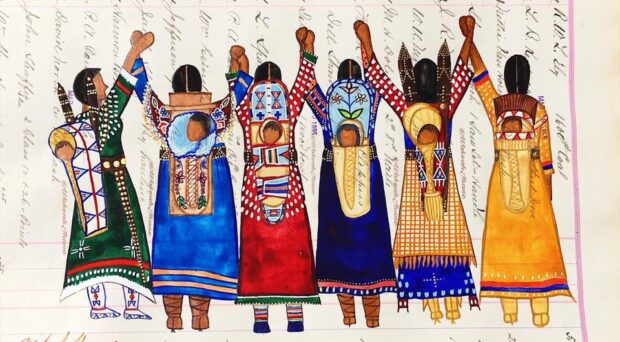
Culturally Safe and Trauma-Informed Care for Indigenous Women
A recent systematic review highlighted that Indigenous women in Canada face systemic barriers and historical trauma that hinder their access to quality healthcare. Recognizing the need for change, the Indigenous Birth Support Worker (IBSW) Program was developed at the Jim Pattison Children’s Hospital Maternal Care Centre in Saskatoon, Saskatchewan. IBSWs are Indigenous women who received teachings in Indigenous birthing ceremonies, cultural practices, Doula training, breastfeeding and nutrition. They completed a practicum placement at the Jim Pattison Children’s Hospital Maternal Services Unit. The IBSW program aims to provide respectful, culturally safe, and trauma-informed care to Indigenous women and their families throughout their birthing journey, offering a positive and empowering experience.
Background and Program Development
The IBSW Program was established in response to an external review of tubal ligation procedures in the Saskatoon Health Region, which uncovered disturbing accounts of Indigenous women being pressured into these procedures. Indigenous women felt helpless and invisible, unable to advocate for their healthcare needs. These negative experiences resulted in unmet needs, dissatisfaction with care, and a lack of trust in the healthcare system.
To address these challenges and respond to the Truth and Reconciliation Commission’s Call to Action #22, the IBSW Program was created. This program integrates Elders and cultural healing practices into Canadian healthcare institutions to provide culturally safe and trauma-informed care for Indigenous women.
Principles of the IBSW Program
The IBSW Program is guided by six fundamental principles proposed by Perinatal Services, BC, aligning with cultural safety and holistic care:
- Cultural safety and cultural humility: The program ensures Indigenous patients feel supported and respected by incorporating cultural practices and traditions into their birthing experiences.
- Self-determination: Indigenous women are empowered to make informed decisions about their healthcare, gaining agency and control over their birthing journey.
- Trusting relationships: Building trust between IBSWs and Indigenous clients is a cornerstone of the program, which includes open communication, active listening, and mutual respect to foster trust.
- Respect for traditional practices and knowledge: IBSWs demonstrate understanding and respect for Indigenous cultural traditions, values, and traditional knowledge related to childbirth.
- Addressing anti-Indigenous racism: The program raises awareness of overt and covert racism experienced by Indigenous individuals in healthcare settings, combating discrimination and creating inclusive care.
- Strengths-based and trauma-informed care: The IBSW Program recognizes and builds upon the strengths of Indigenous women and their families.
The IBSW Program represents a significant step toward achieving equitable and inclusive healthcare for all
Implementing these principles, IBSWs bridge the cultural gap, allowing Indigenous families to integrate their traditional birthing ceremonies and practices. This approach restores birth as a ceremony, fostering cultural continuity and pride.
Evaluation Findings
A qualitative research design was employed to explore the perspectives of program workers and clients. The study, conducted between December 2019 and January 2021, included 1023 clients who accessed care through the program.
As reported in our new paper in BMC Pregnancy and Childbirth, the IBSWs discussed services provided, client needs, barriers to care, communication with other healthcare professionals, lessons learned, and recommendations for improvement. Client interviews focused on program services received, experiences with IBSWs and other healthcare staff, and overall satisfaction.
The findings highlight the significant, positive impact of the IBSW Program. Both program workers and clients expressed high satisfaction with the services provided. The IBSWs’ understanding of Indigenous cultural practices bridged the gap between Western healthcare and traditional birthing protocols, restoring cultural continuity and ceremony.
Clients reported feeling empowered and having increased agency in making informed decisions about their healthcare. The trusting relationship facilitated effective communication and collaboration with other healthcare professionals involved in the client’s care.
The strengths-based and trauma-informed care approach of the IBSW Program proved crucial in supporting Indigenous women and families who had experienced historical and intergenerational trauma. By focusing on their strengths and providing holistic care, the IBSWs fostered resilience and healing.
Recommendations:
The program contributes to healing, resilience, and the well-being of Indigenous women and their families.
- Continued Education and Training: Ongoing education and training are essential to enhance IBSWs’ knowledge and skills in cultural practices, trauma-informed care, and Indigenous health.
- Strengthening Collaboration: Stronger collaboration between IBSWs and other healthcare professionals involved in Indigenous clients’ care can ensure a holistic and coordinated approach to healthcare delivery.
- Community Engagement: Connecting with local Indigenous communities, organizations, and Elders can foster cultural relationships, share knowledge, and provide comprehensive support to Indigenous families.
- Increased Program Awareness and Expansion: Promoting the IBSW Program among Indigenous communities through community events, outreach initiatives, and collaboration with Indigenous organizations and leaders and increasing program capacity and availability.
- Culturally Appropriate Resources: Providing culturally appropriate resources and educational materials reflecting Indigenous traditions, practices, and values to support informed decision-making and promote cultural continuity.
Lessons Learned:
- Importance of Cultural Safety: Creating an environment where Indigenous clients feel safe, respected, and supported is fundamental to their positive birthing experiences.
- Empowerment through Advocacy: The IBSWs’ advocacy empowered clients, enabling them to voice their needs, preferences, and concerns.
- Value of Traditional Practices: Integrating traditional birthing protocols and practices into the process fosters cultural pride and continuity.
Conclusion
The IBSW Program effectively addresses Indigenous women’s negative experiences and unmet needs in the healthcare system. By incorporating the recommendations and building upon existing strengths, the IBSW Program can serve as a model for culturally safe and trauma-informed care in Indigenous communities across Canada. Ongoing collaboration, evaluation, and involvement of Indigenous communities are crucial to ensure the program remains responsive to the diverse needs and aspirations of Indigenous women and their families.
The IBSW Program represents a significant step toward achieving equitable and inclusive healthcare for all, honouring Indigenous traditions, and promoting positive birthing experiences. By valuing cultural safety and humility, addressing historical trauma, and promoting self-determination, the program contributes to healing, resilience, and the well-being of Indigenous women and their families.
 This paper is part of the ‘Disparities in access to sexual and reproductive health services’ Collection in BMC Pregnancy and Childbirth and BMC Women’s Health. You can see all of the papers in the Collection here.
This paper is part of the ‘Disparities in access to sexual and reproductive health services’ Collection in BMC Pregnancy and Childbirth and BMC Women’s Health. You can see all of the papers in the Collection here.
Comments